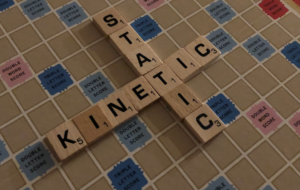Another brave writer shared their first page for critique. Enjoy! My comments will follow.
Chapter One
Envy Rots Your Bones
Grandma Iris had never cradled me like she did that Bible. Sat across the table, she held it tight to her chest, tracing her bony finger down its decorative spine. The golden crucifix embedded in the book’s cover glinted as dawn streamed through the window. A wink… or a jeer… It knew it was Grandma’s favourite.
Jealousy stroked at me, teasing, and I swatted it’s claws away. Envy rots your bones. It’s a sin, I reminded myself. One of Grandma’s many teachings.
Leather creaked as Grandma delicately opened the book upon the table.
“Are you ready, Elisa?” A demand masked as a question.
I inhaled deeply, the cold dusty air of the dining room filling my lungs. I promised Grandma I would do better, be better, this time. And yet, for the second time that afternoon, I sinned.
“I’m ready,” I lied.
Her eyes flickered to mine. Somehow her wrinkles deepened, eyes became darker when they settled on me. And without another word, she fired the first test.
“Luke 1:47?”
With no time to comprehend the question, scripture tumbled out of me.
“My soul magnifies the Lord, and my spirit rejoices in God my Saviour.”
Grandma nodded, a fleeting gesture of approval. “Psalm 107:1?”
Again, I answered without pause, without a doubt. “Give thanks to the Lord for He is good. His mercy endures forever.”
“Excellent, Elisa,” she said, flicking through the dog-eared pages. “Psalm 18:3?”
I opened my mouth, expecting the answer to dance off my tongue again, but… nothing. Only silence filled the room. Scrunching my eyes, I frantically searched the depths of my mind, bible verses scrambled in my head.
‘When you ask, you do not receive,’ – no, not that one. ‘Come near to God, and he will be near to you’– not that either.
I could feel her narrow gaze pinned to me now. Waiting, watching as I drowned amongst the scripture. Her fingers rapped against the oak table, underscoring each second that drifted by, still without an answer, still sinking. How silly of me to make false promises. Of course, Grandma would be disappointed, she always was.
Disappointed.
The word buzzed in the forefront of my mind, sending a ripple of familiarity through me. I said it out loud, feeling each syllable float from my lips.
Dis-a-ppoint-ment.
And with that, I burst to the surface.
“In the midst of disappointment, know that God is listening and-”
But before I could complete the verse, a whoosh of air and the scent of old leather gushed towards me. Pain erupted in my cheek, knocking the words from my mouth and throwing me sideward. As I slammed into the floorboards, my eyes sprung open, just in time to see Grandma lower the bible back to the table.
* * *
Y’know what I love most about this first page? The scene is so complete and compelling, it could double as flash fiction. Anon didn’t feel the need to waste precious real estate by describing the room or the characters in detail. Instead, we’re dropped into the middle of a tense moment, and we cannot look away. This writer also gained empathy for the main character and showed us a lot about the relationship between Elisa and Grandma without resorting to telling. And the voice? Excellent.
I do have a few comments/suggestions, but nothing major.
Chapter One
Envy Rots Your Bones
Grandma Iris had never cradled me like she did that Bible. (<– Compelling first line) Sat Aacross the table, she held it the book tight to her chest, tracing her bony finger down its decorative spine. The golden crucifix embedded in the bible’s book’s cover, glinted as dawn streamed through the window.
*Side note: Holy Bible, since it’s a title, should be capitalized; the bible—not a title—should be lowercase. Some writers prefer to always capitalize Bible. If you’re consistent, I don’t think it’s a big deal either way. When in doubt, listen to your editor.
A wink… or a jeer… It knew it was Grandma’s favourite.
*Side note: When I received the first page, Lynne noted: “UK writer.” Hence the British spelling of certain words, like favourite vs. favorite and Saviour vs. Savior. Please be aware, US spelling is the preferred industry standard.
Jealousy stroked at me, teasing, and I swatted it’s its claws away. (<–Love that line!) Envy rots your bones. It’s a sin, I reminded myself (<–we know it’s inner dialogue without this attrib.). One of Grandma’s many teachings.
Leather creaked as Grandma delicately opened the book upon the table. “Are you ready, Elisa?” A demand masked as a question.
I inhaled deeply (showing the act of inhaling implies deeply, so the adverb isn’t necessary), the cold dusty air of the dining room filling my lungs. I promised Grandma I would do better, be better, this time. And yet, for the second time that afternoon, I sinned. <–Excellent! These last two sentences say so much.
“I’m ready,” I lied.
Her eyes flickered to mine. Somehow her wrinkles deepened, eyes became darkened when they settled on me. And without another word, she fired the first test. (<– Slight hiccup here. As written, it implies “without another word” from Grandma. But I think you meant Elisa. Easy fix. “Without another word from me…”)
“Luke 1:47?” (see below for citing scripture in dialogue)
With no time to comprehend the question, scripture tumbled out of me (comprehend isn’t the correct word. If she didn’t understand the question, she wouldn’t be able to cite the verse. Try: Without much forethought… Or leave out altogether: Scripture tumbled out of me). “My soul magnifies the Lord, and my spirit rejoices in God, my Saviour.”
Grandma nodded, a fleeting gesture of approval. “Psalm 107:1?”
Again, I answered without pause, without a doubt. “Give thanks to the Lord for He is good. His mercy endures forever.”
“Excellent, Elisa,” she said, flicking through the dog-eared pages. “Psalm 18:3?”
I opened my mouth, expecting the answer to dance off my tongue again, but… nothing. Only Silence filled the room. Scrunching my eyes, I frantically searched the depths of my mind, bible verses scrambled in my head.
‘When you ask, you do not receive,’. – (Removed single quotes and incorrect usage of en-dash.) No, not that one. ‘Come near to God, and he will be near to you’–. Not that either.
I could feel Now, her narrowed gaze pinned to on me now. Waiting, watching, as I drowned amongst the scripture. Her fingers rapped against the oak table, underscoring each second that drifted (drifted implies slow. Try: ticked, fled, drained, raced, sped, or another strong verb for fast) by, still without an answer, still sinking (<– Nice visual). How silly of me to make false promises. Of course, Grandma would be disappointed, she always was. (Suggestion: Of course, Grandma would be disappointed, her usual state of mind.)
Disappointed.
The word buzzed in the forefront of my mind, sending a ripple of familiarity through me. I said it out loud, feeling each syllable float from my lips.
Dis-a-ppoint-ment. (Would she really say this out loud in front of Grandma?)
And with that, I burst to the surface. (Consider deleting. I understand Elisa is metaphorically bursting to the surface, but it stopped me. Perhaps others will feel differently.)
“In the midst of disappointment, know that God is listening and—” (Use em-dash, not en-dash, to indicate cut off speech. For more on em-dashes, see this post)
But before I could complete the verse (Redundant since you went through the trouble of showing us the verse had been cut short), aA whoosh of air and the scent of old leather gushed (rushed?) towards me. Pain erupted in my cheek, knocking the words from my mouth, and throwing me sideward. As I slammed into the floorboards, my eyes sprang open, just in time to see catch Grandma lowering the bible back to the table.
The Editor’s Blog has a fantastic article about numbers in fiction. For citing scripture in dialogue, they recommend the following:
For dialogue, spell out the numbers as words. Do this whether a character is saying just the chapter or just the verse or is including both. “My dad always quoted Romans twelve to me.” “My grandmother’s favorite verse was Jeremiah twenty-nine eleven.” “I can’t remember if the verse he quoted was nine or nineteen.” (Could you make an exception for the Psalms? Probably so. “My niece learned how to say Psalm 23 in four languages.” If you consider psalm plus the number a title, I’d say that would work. I don’t know that other books and chapters, however, would get the same treatment.)
Outside of dialogue, use the typical convention for chapter and verse when you include both. Make this one of your exceptions to the rule about when to write out numbers. So—The text he’d quoted was Genesis 3:23.
Yet if you’re using only the verse, spell out the number (use a numeral for numbers greater than 100)—The text he quoted was verse twenty-three.
Also spell out the numbers if you’re not including the book and verses in the typical reference style—The text he was hunting for was in Luke—verses four through eleven of chapter six.
In a reference to the chapter only, you may want to adjust the wording—The text he quoted was from the third chapter of Genesis.
Could you write Genesis 3 or 1 Timothy 5? Probably. And I’d suggest using that format for the Psalms, writing Psalm 119 or Psalm 23. Yet such a format with other bible books might be difficult for readers, at least at first glance. You may want to play around with how you say it if you’re only including the book name and chapter number without a verse number. After all, many people would understand easily if you wrote—He loved the Twenty-third Psalm.)
Brave Writer, I really enjoyed this first page. Thank you for sharing your work with us.
I’d turn the page to find out what happens next. What about you, TKZers? Any suggestions/comments for this brave writer? Favorite line?



 It may be the most famous (infamous?) case of writer’s block in the annals of American lit: George R. R. Martin is having trouble completing his epic fantasy series A Song of Ice and Fire (of which A Game of Thrones is the first volume). It’s been over ten years since the last book, A Dance with Dragons, came out, and there is no pub date in sight for the next one, titled The Winds of Winter.
It may be the most famous (infamous?) case of writer’s block in the annals of American lit: George R. R. Martin is having trouble completing his epic fantasy series A Song of Ice and Fire (of which A Game of Thrones is the first volume). It’s been over ten years since the last book, A Dance with Dragons, came out, and there is no pub date in sight for the next one, titled The Winds of Winter. 

 Last week, I had the honor of spending an hour or so with David Temple on his excellent podcast,
Last week, I had the honor of spending an hour or so with David Temple on his excellent podcast,  She put one hand behind her and flipped the snap of her halter and tossed it to the floor, staring at him with eyes of liquid smoke in which there was a curious and great disinterest. – From Here to Eternity by James Jones
She put one hand behind her and flipped the snap of her halter and tossed it to the floor, staring at him with eyes of liquid smoke in which there was a curious and great disinterest. – From Here to Eternity by James Jones